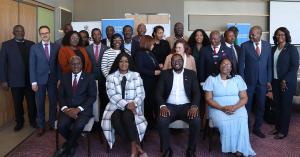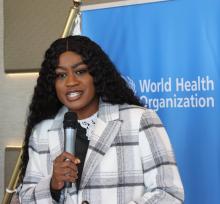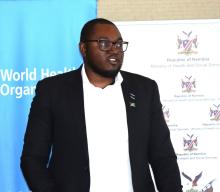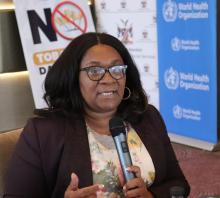Using health taxes to promote improved health outcomes
Tobacco use and excessive alcohol consumption are major causes of death and illness in low- and middle-income countries (LMICs). They significantly contribute to non-communicable diseases such as cancer, heart disease, and liver conditions. Tobacco use in Namibia is estimated to be 13.2% in 2025 for people aged 15 years and older, a slight decline from 14.9% in 2022, against a global average of 19.8%. In 2022, total alcohol consumption per capita was estimated at 12.0 litres of pure alcohol annually for people aged 15 years and older, compared to 3.5 litres at the regional level and 5.0 litres globally.
Dr Esperance Luvindao, the Minister of Health and Social Services, emphasized the importance of raising taxes on both tobacco and alcohol products to reduce accessibility through higher prices, especially among young people. Dr Luvindao spoke at an engagement with members of parliament and other stakeholders organized by the Ministry of Health and Social Services in partnership with the World Health Organization to explore policy options to strengthen tobacco and alcohol control.
She noted progress under the Tobacco Product Control Act (2010) and its 2014 regulations, but highlighted the ongoing burden from tobacco and alcohol use on the health care system. “Additional deterrent measures are needed, especially through tax reforms,” she stated, stressing that excise taxes are among the most effective tools, particularly for safeguarding youth. Although some modest tax hikes have been introduced under the SACU agreement, she recognized opportunities for stronger tax policies. Minister Luvindao also revealed plans to amend the Tobacco Products Control Act to include emerging products such as hookah pipes, e-cigarettes, and vapes, which are gaining popularity among young Namibians.
During the same event, Dr. Richard Banda, WHO Namibia Representative and represented by Mrs. Celia Kaunatjike, emphasized progress in combating the global tobacco epidemic. He noted that more than 75% of the world's population benefits from at least one MPOWER measure, which supports the implementation of the WHO Framework Convention on Tobacco Control (FCTC). Data from 2022 show a continued decrease in global tobacco use, with about 1 in 5 adults using tobacco now, down from 1 in 3 in 2000. He attributed this progress to the ‘power of sustained public health efforts, strong policies, global coordination and collaboration, effective partnerships, and local action’.
Dr. Banda further emphasized that multisectoral collaboration and partnerships with the legislature are essential for creating a strong framework for tobacco control and developing strategies to minimize the harmful use of alcohol. He concluded by stating, ‘We must act decisively to protect health by closing the remaining policy gaps, strengthening enforcement, and investing in proven tools, such as MPOWER and SAFER measures. These measures save lives, reduce healthcare costs, and safeguard future generations from tobacco and alcohol addiction’.
The meeting aimed to provide a platform to share information on cost-effective and high-impact strategies that can inform discussions and decisions in both houses of parliament. It also offered an opportunity for partnership with the health sector to ensure a united front in advocating for policy and legal reforms that protect and safeguard the health of every Namibian.
The Governor of the Khomas Region, Hon. Sam Nujoma Jr., alluded to this ethos, emphasizing the importance of prioritizing health in policymaking and reminding lawmakers of their responsibility to promote legislative change in the interest of the Namibian nation. “The time is now. As leaders and policymakers, we play a pivotal role in shaping legislation that not only supports economic progress but also safeguards the health and well-being of Namibians. Health is wealth and there is no wealth without health," stated Hon Nujoma.
Forty-five participants attended the meeting, where they proposed revisions to the existing Tobacco Product Control Act and offered both immediate and long-term policy recommendations for tobacco regulation and alcohol availability restrictions through local authorities. This collaboration with parliament members is part of two partnership initiatives between WHO and the Ministry of Health and Social Services aimed at implementing the MPOWER and SAFER technical packages for tobacco and alcohol control.








